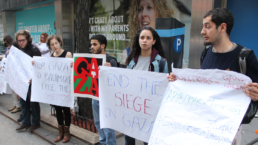Federal law enforcement is under pressure to launch specious terrorism investigations into pro-Palestinian protesters on college campuses, based solely on their public statements.
by Anthony O’Rourke and Wadie E. Said, Dissent
In the 1960s, the FBI’s counterintelligence program (COINTELPRO) routinely infiltrated campus antiwar and civil rights groups, investigating thousands of students with the aim of discrediting their activism and destroying their career prospects. After a Senate committee led by Frank Church exposed this practice, the FBI disavowed it and applied a heightened standard for initiating investigations at universities. There is reason to believe, however, that federal law enforcement is facing pressure to relax its self-restraint and investigate pro-Palestinian student activists using a tool not at its disposal in the heyday of COINTELPRO: a nebulous federal statute that imposes prison sentences of up to twenty years for providing “material support or resources to a foreign terrorist organization.” This statute criminalizes public advocacy that is done under the direction of or in coordination with foreign terrorist groups. There are few legal constraints, however, that would prevent a motivated FBI from using pro-Palestinian speech as grounds for investigating students who have no connection to such a group.
In late October, the Anti-Defamation League (ADL) and the Brandeis Center published an open letter urging universities to investigate Students for Justice in Palestine (SJP), a student activist group with both national and local chapters, under the material support statute. According to this letter, SJP chapters merit investigation under the material support statute for “endors[ing] the actions of Hamas” and “voicing an increasingly radical call for confronting and ‘dismantling’ Zionism on U.S. college campuses.” As the ACLU and others have observed, the ADL offers no evidence that SJP students have done anything more than exercise their constitutionally protected speech rights. Still, the state of Florida has already obliged the ADL’s request, invoking the material support statute and its state analog to ban Florida’s SJP chapters. (The ACLU of Florida and Palestine Legal have filed a lawsuit against the ban, and fears of personal liability may have led the chancellor of Florida’s state university system to walk it back.)

It is tempting to read the ADL’s letter simply as offering universities a way to discipline anti-Israel activism that is continuous with the ongoing suppression of pro-Palestinian campus speech, often in ways that many would have found unimaginable just months before. Columbia University has canceled pro-Palestinian speakers, in one case under the pretext of “security concerns” and in one case without that pretext. The University of Pennsylvania censored a documentary critical of Israel. And several universities, including Columbia and Brandeis, have suspended or banned their chapters of SJP.
Recent Posts
‘Unconstitutional. Unethical. Authoritarian.’ ICE Bars Millions Of Immigrants From Bond Hearings
July 18, 2025
Take Action Now One watchdog said the new policy “seems like a blatant attempt to stop them from exercising their right to due process.”……
Americans Are Not Nearly Alarmed Enough About Climate Change
July 18, 2025
Take Action Now Americans still don’t comprehend how imminent, dangerous, and far-reaching the threat is—and journalists are partly to blame.By…
The IRS Is Building A Vast System To Share Millions Of Taxpayers’ Data With ICE
July 17, 2025
Take Action Now ProPublica has obtained the blueprint for the Trump administration’s unprecedented plan to turn over IRS records to Homeland Security…
Israel’s Sudden Assault On Syria Is Unchecked Aggression
July 17, 2025
Take Action Now Jerusalem is bombing Damascus and threatening al-Sharaa’s rule, while Washington was hoping to help the nascent government on…




